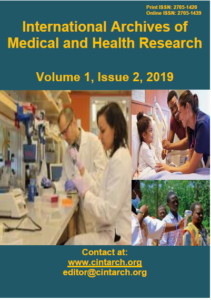
International Archives of Medical and Health Research (IAMHR), pISSN: 2705-1420; eISSN: 2705-1439
March to April 2019 Vol 1(2): pp.29-35 DOI: https://doi.org/10.33515/iamhr/2019.010/10
Copyright © 2019 C-International Archives
Original Article
Correlates of type 2 diabetes mellitus and the glycemic profile of patients attending the Medical Outpatient Clinic of Specialist Hospital, Sokoto, Nigeria
Afeez T. Aderahman1*, Kehinde J. Awosan2 , Oche M. Oche1,2 , Anas A. Sabir3
1Department of Anaesthesia, Usmanu Danfodiyo University Teaching Hospital, Sokoto, Nigeria, 2Department of Community Health, 3Department of Internal Medicine, Usmanu Danfodiyo University, Sokoto, Nigeria
*Corresponding Author’s Email: aderahmanafeez@gmail.com
Published April 30, 2019
ABSTRACT
Background: Several disease conditions and lifestyle behaviors have been identified as correlates of diabetes mellitus. Aim: This study aimed to determine the correlates of type 2 diabetes mellitus and the glycemic profile of patients attending the Medical Outpatient Clinic of Specialist Hospital, Sokoto, Nigeria. Materials and Methods: This was a cross-sectional study among 300 patients selected by systematic sampling technique. Anthropometric measurement, blood pressure measurement, and estimation of fasting plasma glucose and lipid profile were done for the participants in addition to questionnaire administration. Data were analyzed using IBM SPSS version 20 statistical computer software package. Results: About a tenth, 37 (12.3%) of the 300 participants currently smoke cigarette, close to a fifth consumed alcohol in the last 12 months (17.3%) and 30 days (15.7%), and majority of them consume fatty foods (67.7%), and eat less than 3 servings of fruits (76.7%) and vegetables (52.7%) daily, Less than half of participants (47.3%) do moderate intensity work, and less than a fifth of them (16.3%) engage in regular moderate intensity sport and leisure activities. Majority of participants (75.0%), reported being on treatment for hypertension, about a third had raised blood pressure (35.0%) and were overweight (38.7%); 12.0% were obese, 20.3% had elevated cholesterol, while 45.3% had poor glycemic control. Conclusion: This study showed high prevalence of the behavioral and metabolic risk factors (correlates) of type 2 diabetes mellitus among the participants with a high proportion of them having poor glycemic control. Diabetes care providers should comprehensively address the correlates of the disease and not just focus on administration of medications.

